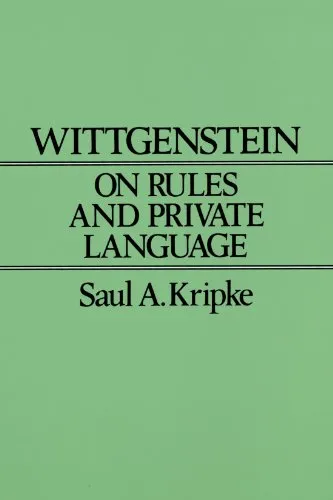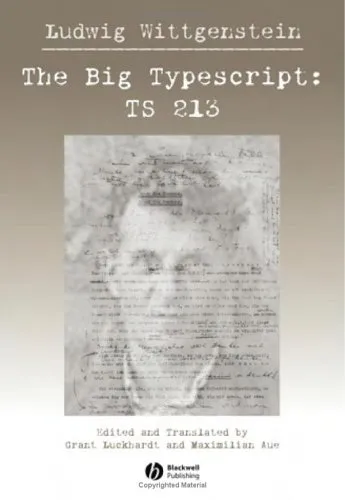Wittgenstein on Rules and Private Language: An Elementary Exposition
4.0
Reviews from our users

You Can Ask your questions from this book's AI after Login
Each download or ask from book AI costs 2 points. To earn more free points, please visit the Points Guide Page and complete some valuable actions.Related Refrences:
Welcome to the world of one of the most profound expositions on Ludwig Wittgenstein's later philosophy. 'Wittgenstein on Rules and Private Language: An Elementary Exposition', written by Saul A. Kripke, delves into the heart of linguistic philosophy, exploring the enigmatic concepts articulated in Wittgenstein's later works, especially the 'Philosophical Investigations'. This book challenges traditional interpretations and offers a revolutionary view that has spurred significant philosophical discussions.
Detailed Summary of the Book
In 'Wittgenstein on Rules and Private Language', Kripke provides an accessible yet deeply analytical interpretation of Wittgenstein’s ideas. The book is centered around what has famously come to be known as 'Kripkenstein', a philosophical paradox that questions the very nature of following rules and meaning in language. Kripke describes how Wittgenstein's arguments dismantle the notion of a private language — that is, a language understandable by only a single individual. He argues that language inherently requires a community for the establishment and assessment of meaning.
Kripke reconstructs Wittgenstein's philosophical investigations, focusing specifically on rule-following as a practice. The key question examined is: What does it mean to follow a rule? This seemingly simple inquiry gives rise to profound implications about human understanding, knowledge, and the communal nature of language. By dissecting this paradox, Kripke leads us through intricate philosophical arguments that question conventional semantics, ultimately proposing that rules do not have a fixed interpretation but rather derive their meaning from communal agreement and practice.
Key Takeaways
- The interpretation of rules is not determined by a private or personal understanding, but through communal engagement and discourse.
- Wittgenstein's ideas challenge foundational beliefs about the certainty of language and meaning, suggesting that ambiguity and variability are inherent to linguistic communication.
- Language is intrinsically a social construct that requires shared human behaviors and interactions.
- Kripke's exposition offers a way to navigate Wittgenstein's complex ideas through logical clarity, encouraging further philosophical inquiry and debate.
Famous Quotes from the Book
Some of the most touching insights in Kripke's book include:
"The problem of meaning and rule-following is, in its essence, a problem about the nature of human community."
"Each person cannot have a private understanding, as if ‘hidden’ from others in a metaphysical sense; all understanding must be accountable to communal standards."
Why This Book Matters
Kripke's 'Wittgenstein on Rules and Private Language' is a pivotal work for anyone interested in philosophy, particularly those fascinated by the philosophy of language. It ignites critical analysis of how meaning is conferred by linguistic practices, stressing the importance of community in shaping knowledge and understanding. The book's insights into the nature of human communication resonate not only in philosophical circles but also in various disciplines that grapple with concepts of understanding and interpretation, such as cognitive science, linguistics, and sociology. Furthermore, it invites philosophical enthusiasts to reevaluate established interpretations of Wittgenstein’s work, keeping his ideas alive and relevant in contemporary discourse.
Free Direct Download
You Can Download this book after Login
Accessing books through legal platforms and public libraries not only supports the rights of authors and publishers but also contributes to the sustainability of reading culture. Before downloading, please take a moment to consider these options.
Find this book on other platforms:
WorldCat helps you find books in libraries worldwide.
See ratings, reviews, and discussions on Goodreads.
Find and buy rare or used books on AbeBooks.



